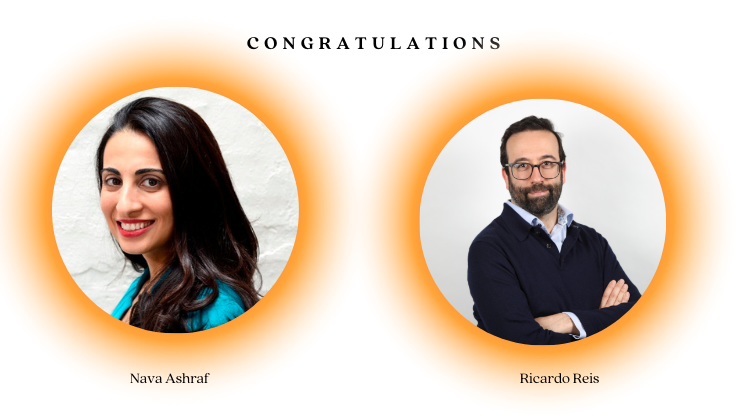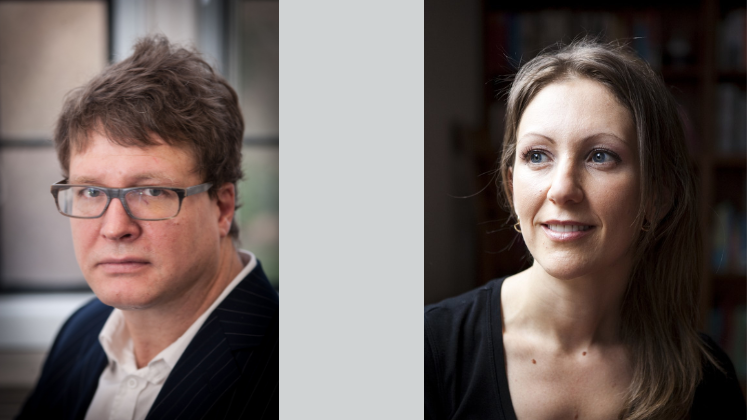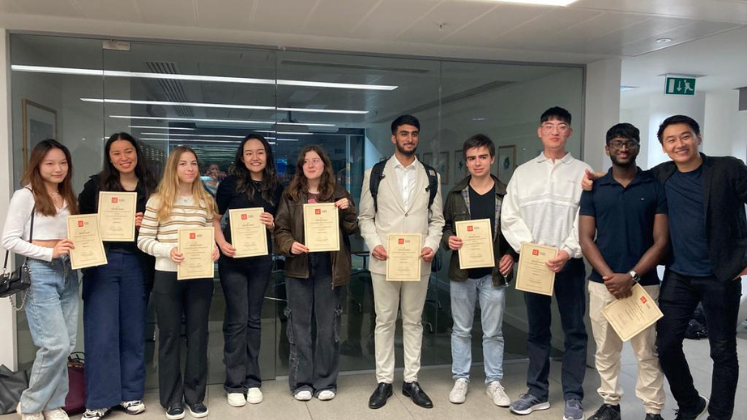2023/24
Professors Nava Ashraf and Ricardo Reis Elected Fellows of the British Academy

The Department of Economics at LSE is proud to announce that Professors Nava Ashraf and Ricardo Reis have been elected Fellows of the British Academy, in recognition of their outstanding contribution to humanities and social science.
Founded in 1902, the British Academy is the UK’s national academy for the humanities and social sciences. It is a Fellowship of over 1700 of the leading minds in these subjects from the UK and overseas, as well as being a funding body for research and a forum for debate and engagement.
Professor Nava Ashraf, Professor of Economics and Research Director at the Marshall Institute, works on a combination of psychology and economics, using both lab and field experiments to test insights from behavioural economics in the context of global development in Africa, Latin America and Southeast Asia.
Professor Ricardo Reis, A W Phillips Professor of Economics, has expertise in macroeconomics; monetary economics; financial economics; international macroeconomics; and time-series econometrics.
To find out more about this year’s British Academy Fellows, please visit The British Academy welcomes 86 new Fellows in 2024 | The British Academy.
July 2024
ERC Advanced Grants awarded to LSE Department of Economics Professors: Robin Burgess and Silvana Tenreyo

Professors Robin Burgess and Silvana Tenreyo from the Department of Economics at LSE have been awarded prestigious European Research Council (ERC) Advanced Grants. They are among 255 outstanding research leaders this year to have been awarded what is some of the EU’s most competitive funding by the ERC.
Professor Robin Burgess, Department of Economics was awarded ERC funding for his project, Innovation and the Environment.
Professor Burgess, said: “It is becoming ever more apparent that the way out of the tension between growth and climate change is innovation. These innovations will not only have to slow the emissions that are driving climate change but also protect people from the unfolding damages. This project will shed light on three major questions: (1) how can we enhance resilience to climate change?; (2) how can we design smart conservation policies?; and (3) how can we promote innovation and diffusion of clean energy?
The support of the ERC is transformational as it helps to catalyse a movement to place environmental issues at the heart of economics and economic policy. Doing this is critical to bringing human activity and the natural environment into greater balance and is central to the future or our planet. Pushing this movement forward will require collaborations with a range of organisations and researchers. I am deeply deeply grateful to the support that the ERC is has provided to me over the years and am excited to take this work forward.”
Professor Silvana Tenreyo, Department of Economics, will receive funding for her project, Challenges to Current Monetary Policy Thinking: New quantitative frameworks and empirics.
Professor Tenreyo, said: “I am delighted and deeply grateful to receive the ERC grant. The support from ERC grant will be crucial to carry out this project, which will entail the collaboration with many other researchers and PhD students.
The recent sequence of extraordinary shocks and the prospect of more frequent supply shocks caused by geopolitical or climate-related events have ignited the debate over how macroeconomic policy should prepare and respond in the future. The main objective of this project is to develop quantitative frameworks suitable for the evaluation and analysis of macroeconomic policy in this fast changing global environment. The first strand studies macroeconomic policy in times of crisis that could be triggered by climate change or geopolitical events, causing shortages in critical inputs. The second strand focuses on policy transmission lags–the time taken between a policy action and its economic effects-- and studies how best to conduct policy in settings with long and imprecise lags. The third strand zooms in on a key question for monetary policy effectiveness in emerging (and some advanced) economies: the conduct and effectiveness of monetary policy in a world of dollar dominance.”
The grants will support leading research in fields ranging from life sciences and physical sciences to social sciences and humanities. Targeting established and leading researchers, the competition attracted 1,829 proposals, which were reviewed by panels of internationally renowned researchers. Nearly fourteen percent of proposals were selected for funding. Estimates show that the grants will create 2,480 jobs in teams of new grantees.
The new ERC grants total nearly €652 million are part of the EU’s Horizon Europe programme. The European Commision and the UK Government have reached an agreement on the association of the UK to Horizon Europe for the 2024 budget and onward.
Find out more about the ERC Advanced Grants here.
April 2024
Envisioning an economy that works for all

Thanks to a transformational gift from the Open Society Foundations, the London School of Economics and Political Science will launch a major new initiative focused on the political economy of ‘cohesive capitalism’.
The Programme on Cohesive Capitalism will explore new economic models that genuinely work for all citizens. Led by Professor Sir Tim Besley, School Professor of Economics and Political Science, and housed in the Suntory and Toyota International Centres for Economic and Related Disciplines (STICERD) within the Department of Economics, the programme will bring together LSE’s world-class thinkers in political philosophy and the social sciences to address fundamental questions about what kind of economy will best support global communities and to discuss the policies that can help to support that ambition.
Recognising that ideas alone are not enough to bring about change, the programme will include ambitious strands of public engagement and curriculum development. It will help to maintain LSE’s position at the forefront of developing new ideas and policies that promote opportunity, tackle inequality, and create a more stable and cohesive society.
‘Cohesive capitalism’ refers to a form of capitalism that has three distinct but related aspects. First, that certain social preconditions are required for the existence of a stable and successful capitalist society – specifically, a sense of common purpose and social solidarity that fosters a widespread commitment to economic institutions and a strong state. Second, that those institutions are designed to enable participation in economic life that is open to all, with widely shared benefits of economic prosperity. Third, that it is built on democratic political institutions, where personal freedom and rights are guaranteed.
While ‘cohesive capitalism’ is the organising concept for this major new programme of research and engagement, it is not intended to pre-judge its outcomes. The overarching aim is to propose a vision for an economic system built on sound analytical and normative foundations, complemented by a realistic theory to bring about positive changes to societies.
Commenting on the new programme, Professor Sir Tim Besley said: “There is enormous discontent with our current economic model — and rightly so. This new multidisciplinary programme provides an exciting opportunity to create the kind of dialogue between philosophy and social science that is essential if we are to find a better way of doing things, and to develop a body of research that is useful to citizens and policymakers around the world."
Open Society Foundations
A long-standing supporter of LSE, the Open Society Foundations work to build vibrant and inclusive democracies whose governments are accountable to their people. The Foundations were founded in 1993 by LSE alumnus George Soros (BSc Economics 1951, MSc Philosophy 1954).
Leonard Benardo, Senior Vice President of the Open Society Foundations, said: “The Ideas and Fellowships Collaborative at the Open Society Foundations supports efforts that spur interrogation of key open society concepts and exploration of heterodox ideas and aims to inspire renewal in research and teaching across institutions of higher education and their role in searching for solutions to global open society challenges. In tackling some key research themes and questions, LSE’s new Programme on Cohesive Capitalism will bring together diverse research expertise within the School and beyond to envision fairer, more inclusive and prosperous economic systems. We are proud to be partnering with LSE on this promising initiative.”
Professor Susana Mourato, LSE Vice President and Pro-Vice Chancellor for Research, added: “The challenges faced by the world have compelled the global community to re-evaluate many aspects of contemporary society. LSE plays a leading role in finding solutions to seemingly intractable problems, taking an evidence-based approach to policy that has transformed the way important decisions are made.
"Transformative change can only be achieved through partnership. We are honoured to be partnering with the Open Society Foundations and the Ideas and Fellowships Collaborative to tackle one of the most pressing challenges of our time by reimagining new economic models that truly work for all.”
For more information about this new initiative at LSE, visit Cohesive Capitalism
January 2024
Congratulations to our LSE100 Award winners
 Winners of the LSE100 Award (Economics)
Winners of the LSE100 Award (Economics)
On Tuesday 10 October, students and staff gathered in the Cheng Kin Ku Building to celebrate this year’s LSE100 award winners.
This award recognises the exemplary work that these students and their fellow group members produced during their LSE100 group research project during Lent Term 2023, including their commitment to interdisciplinary investigation and effective team collaboration.
In light of their outstanding work, they were nominated by their LSE100 teachers, and their award was confirmed following a review of their work by the LSE100 Co-Directors.
Please join us in extending warm congratulations to the following recipients of the LSE100 Award for Outstanding Academic Achievement in the Department of Economics:
- Adarsh Kumar
- Evelyn Jennings
- Maria Karamitsani
- Yingqi Han
- Tarren Manodheeran
- Ricardo Cervera
- Roujia Lu
- Nusrat Hossain
- Crystal Hardy
- Robin Fang
- Yuqing Qian
You can find out more about the Reception and the 2022-2023 LSE100 award winners here.
October 2023
Congratulations to our Professor of Economics, Benjamin Moll for receiving VIII Calvó-Armengol Prize
His groundbreaking research explores how the wealth gap between individuals and countries affects the entire global economy.
The Barcelona School of Economics and the Government of Andorra have announced that the eight Calvó-Armengol International Prize in Economics will be awarded to Benjamin Moll.
About the Calvó-Armengol Prize:
The Calvó-Armengol International Prize in Economics memorializes Antoni Calvó-Armengol, who passed away in 2007 at 37 years of age. It is awarded every two years to an economist or other social scientist who is not older than 40 years old for contributions to our understanding of social structure and its implications for economic interactions.
The Prize is promoted by the Barcelona School of Economics and the Government of Andorra.
Find out more about the VIII Calvó-Armengol Prize here.
October 2023
Professor Silvana Tenreyro appointed a Commander of the Order of the British Empire
Professor Silvana Tenreyro has been appointed a Commander of the Order of the British Empire (CBE) in the 2023 King’s birthday Honours, for services to the economy.
Silvana Tenreyro is a Professor in Economics at LSE, a Fellow of the British Academy, and Programme Director for CEPR’s International Macroeconomics and Finance, Development Economics programme.
She is former President of the European Economic Association and was an External Member of the Bank of England’s Monetary Policy Committee (MPC) for two consecutive terms from 2017.
Professor Tenreyro’s research focuses on Macroeconomics, Macro-Development and International Trade and Finance.
Commenting on the announcement, Professor Silvana Tenreyro said: I’m really grateful to receive a CBE. It’s been an honour to serve on the MPC over the past six years and I’m thankful to colleagues at the Bank and LSE, as well as my family, for their support”.
October 2023